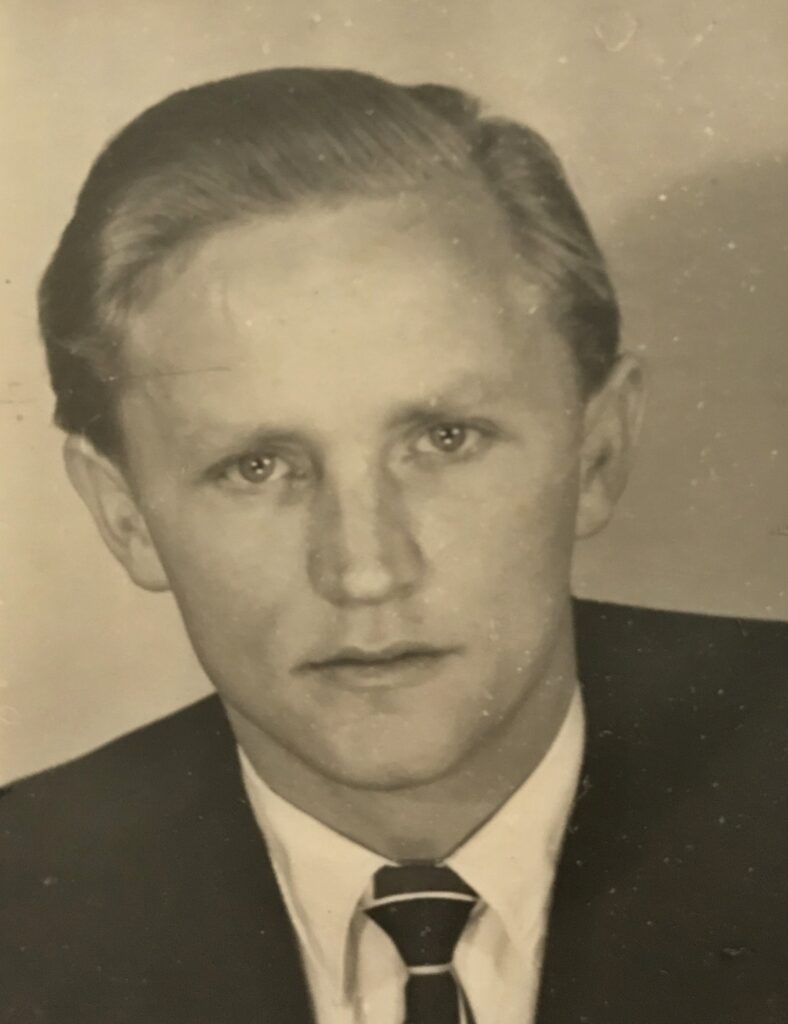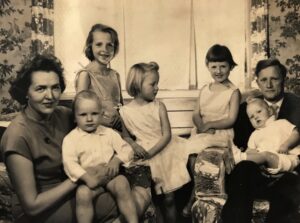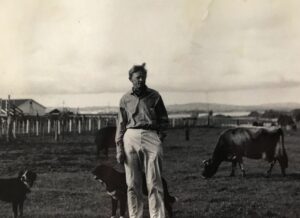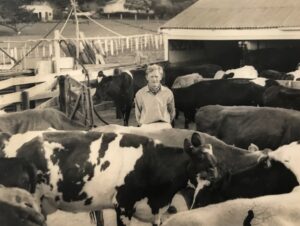Jaroslav Trombík
I was born on January 17, 1924 in Oldřichovice in Silesia as the fourth of five children. I grew up on a family farm and helped with cattle from early childhood. After elementary school, I attended high school in Český Těšín and I was a pretty good student. I enjoyed physics the most and I had some talent for science. I also liked playing chess. The war came and the Germans closed our school in 1941. Later, some students were investigated by the authorities to see if they were of Jewish descent. I had blond hair, blue eyes and German ancestors on my mother’s side, so they even offered to let me join the SS. I refused, of course. I went to private school where I learned shorthand, typewriting and English, but in a few months the Germans closed it, too, and sent me and other young men to the coal mines in Michalovice, where I worked hard, nine hours a day, seven days a week. The food was miserable, as well as the living conditions. One night in the summer of 1944, I escaped from a labor camp and managed to get home. I suffered from bilateral pneumonia. I had the consequences for a long time. When the war ended, I entered the University of Agriculture in Prague and then continued in Brno at the Veterinary University.
I arrived at a refugee camp in Munich and figured out where to go next

When the Communists came to power, they tried to entice me into joining the party. Instead, I left Czechoslovakia illegally in September 1949. I didn’t want the family to have problems with the police, so I didn’t tell anyone about my intentions. I thought my exile wouldn’t last long. However, I was not able to return for twenty-five years. Unfortunately, my father, with whom I had a very close relationship, was no longer alive by then.
I arrived at a refugee camp in Munich and figured out where to go next. The doctor said I probably had tuberculosis, so they sent me to a sanatorium in Luttensee in the foothills of the Alps. Although my health had improved, of all the countries where I applied for emigration, I was not rejected only by Norway and New Zealand. I decided to go to the other side of the world because the New Zealand authorities promised me I could complete my veterinary studies there.
It took six weeks on a steamship from Bremerhaven to Sydney and from there another nine hours by seaplane to Wellington, where I found myself on November 21, 1951. I got a job at a farm in Invercargill on the South Island. Farmer Bill greeted me and noticed that I had a tweed jacket and hand-sewn shoes. He bought me a work outfit and accommodated me in a small cabin. At half past four in the morning, I had to get up and milk the cows, then drive six hundred sheep to pasture, ride a tractor, plow the fields, transport milk to the market. After two years, I was able to leave, settling in Auckland, working in a toothpaste factory, later as a carpenter, but I was always eager to become a veterinarian.
When I saved enough money in 1955, I went to Sydney to try the exams to the Faculty of Veterinary Medicine, but I was not accepted. I returned to Auckland, where I wanted to work in the construction business, but then an offer came to co-own a large farm. I accepted and I did not leave farming until retirement age.
I met my wonderful wife Růženka (Rosemary), originally from Pardubice. She had two children from her first marriage. In 1960, we got married and another four children were born. We were a big and happy family. After many years of living on a farm, we moved to the Kohimarama neighborhood of Auckland in 1992. Alas, Rosemary passed away soon after, so I returned to the farm and modernized it.
As long as I could, I flew to Prague every year
I enjoyed meeting local Czechs, and it bothered me that we were not organized in a club. So in 1983, a few friends and I looked for Czech-sounding names in the phone directory and invited them to a goulash party. The result was the foundation of the Association of Czechs and Slovaks in Auckland, with seventy members. Until my old age, I organized compatriot events such as St. Nicholas parties, picnics, concerts and discussions with guests from the Czech Republic. As long as I could, I flew to Prague every year and then spent a few weeks in the Beskydy Mountains. I always missed the deep Beskydy forests. After a long stay in the Czech republic, however, I could not wait for a walk on the beach in Auckland. I also visited two daughters living in Sydney. You can say I’m a schizophrenic, but I have two homelands. Which one is the real one? I don’t know. I carry one in my heart and the other in my head. Despite the reversals of life, I think I had and still have a happy life. I never felt poor, even when I was totally penniless. I believe the most important thing is to stay optimistic.
The oldest Czech in New Zealand, Jaroslav Trombík, will soon celebrate his 98th birthday. He lives in an old aged residential village near Auckland.







B.Kmenta Chobocka
Wonderful insightful glimpse into a life in exile that squeezed every possibible joy from being alive.
Sandy Greer
Hi everyone, we were the farmers who ran Jaroslav’s Farm here in New Zealand till he had to have more permanent care.. he lived in paddock across from the main farm house, we saw and spoke to him regularly and visited with him in his house to give an update on what was happening on the farm etc. Its with great sadness to tell that Jim passed away Thursday 27th Jan 2022, peacefully in his sleep.
Regards
Sandy & Ian Greer..
Anna Scott
It might also be of interest to add that:
Ruzena was alongside Jaroslav when he received an Honorary Doctorate from Brno University in 1990.
The outpouring of sadness at his passing is testament to the fact he was a much loved ‘gentleman and scholar’.